Use the shop button to pay for Memberships & Certifications.
1-877-362-1219

National Police Canine Association
Mailing address: npca po box 538 waddell, arizona 85355, attention: applications for trainer will not be accepted until after the national seminar, as we are reviewing and updating the position requirements., certifying official class-zoom presentation, zoom-co class: february 23, 2024 6:00 pm eastern time email [email protected] to get on the class.
Zoom CO Classes will be offered quarterly. Please watch here for the next class to be scheduled. February 23, 2024 6:00 PM EASTERN TIME Email [email protected] to get on the class list.
- Once the date and time has posted, you will need to email the instructor (which will be provided here also) to let them know you will be joining and then they will send you the link.
NPCA is a non-profit association dedicated to the training, development, and certification of law enforcement canine teams and their administrations. NPCA strives to be the best resource for the professional canine unit. NPCA offers nationally accepted certifications throughout the year, across the United States. NPCA also provides regional and national canine training seminars. Our certifications offer realistic and attainable goals for today's working service dog team. NPCA promotes and assists in the utilization of police service dogs in prevention and detection of crime. NPCA has Trainers, Instructors, a Standards Committee and Board of Directors with vast canine experience in all canine related aspects.
2024 National Training Seminar
Dog-less Seminar.
Sheraton Overland Park
Overland Park, KS 66211
August 19-22, 2024
Hotel Reservation Link:
Book Your Room Here
NPCA Certification: Defense Case
Quick references, membership application.
Now you can submit your application and pay online all in one location.
Regional Training
Check here for upcoming Training and certifications in your Region.
Download all the paperwork you need for your certifications.
Master Score Sheets
Current Rule Book.
NPCA is proud of our members and likes to recognize them for their outstanding commitment to the communities that they serve.
Download all the master score sheets before the certification.
Donate as you Shop
We are now registered with Amazon Smile! Please choose National Police Canine Association as your charity of choice when you do your online shopping! Thanks!
Support the National Police Canine Association Inc by shopping at AmazonSmile. When you shop at AmazonSmile, Amazon will donate to National Police Canine Association Inc. Support… https://smile.amazon.com/
Inspiration
Click on the below link for truly inspiring video.
Grace, Guts & Gratitude
Please check out our Facebook page.
NPCA-Facebook
Contact Brennan: [email protected]
Drop us a line!
This site is protected by reCAPTCHA and the Google Privacy Policy and Terms of Service apply.
P.O. Box 538, Waddell, AZ 85355, US
Copyright © 2024 National Police Canine Association - All Rights Reserved.
Powered by GoDaddy

K-9 Training
Supporting K-9 units nationwide since 1998.
how we help
The National Police Dog Foundation assists law enforcement agencies to ensure that the handlers and K-9s are receiving the very best training.
The initial training of K-9s and related training can be very expensive. Many many hours of hard work goes into training and preparing the K-9s for the many different scenarios they will face in active duty.
Dogs used in law enforcement are trained to either be “single purpose” or “dual purpose.” Single purpose dogs are used primarily for backup, personal protection, and tracking. Dual purpose dogs do everything that single purpose dogs do and also detect either explosives or narcotics.
Help us to assist law enforcement agencies to protect and serve.
The Journal of the NPS Center for Homeland Defense and Security
Bring in the Dogs: Using Canines to Improve School Safety and Security
By Matthew Cybert

Matthew Cybert's thesis
– Executive Summary –
Violence, in many ways, challenges school safety on a regular basis in the United States. According to the Washington Post, since 1999, gun violence in America’s schools has affected more than 187,000 students in thirty-six states, and 2018 was one of the deadliest years thus far. Between 1970 and today, there have been a total of 1,360 school shootings in grades K–12. But it is not just about shootings: the Centers for Disease Control and Prevention purports that violence in the form of bullying, fighting, or gang activity in schools may not only physically but also emotionally harm students. Statistical reporting by the National Center for Educational Statistics revealed that 827,000 students suffered from some form of violence during the 2017 school year. Current scholarship reveals mixed findings on the effectiveness of school safety initiatives, and on the impact of armed security and school resources officers (SROs). Some research supports the effectiveness of the presence of SROs, but few studies offer overwhelming evidence that an armed security or SRO presence yields a safer school environment. Schools have implemented physical security measures as well, such as metal detectors, access control, and security cameras. The limited scholarly literature on the impact of these physical-security measures reveals their marginal effect on school safety. One of the more promising initiatives is the threat assessment models from the Secret Service and FBI, which focus on mitigation by assessing and managing individuals who have a propensity toward violence. School violence persists, however, despite well-intentioned initiatives aimed at curbing it—threat assessments, SROs, metal detectors, cameras, and similar means. Continued effort is needed to discover the right combination of approaches. It may be time to bring in the dogs—literally. Dogs can save lives by locating hidden bombs, solve crimes by revealing a concealed drug stash, and catch suspects who flee. Dogs help people who suffer from a physical handicap, mental illness, or emotional disorder. Dogs are pets and they are also valuable colleagues, but they are largely absent from schools. This thesis asserts that dogs possess therapeutic and security instincts that can benefit current school safety initiatives, especially when combined with a school resource officer (SRO). Humans love dogs, dogs love humans, and dogs are smart enough to ensure it stays that way. School counselors, teachers, SROs, and coaches alike all strive to bond with, understand, and help the students they support. These professionals do not always succeed, and this is precisely why dogs make sense. The complexities and humanlike functioning of a dog’s mind further bolster their fittingness for schools. With a dog as a partner, an SRO can be significantly more effective at physical security. The stressors students face may lead to violent actions, and therapy dogs are specially trained to provide emotional assistance to students in need, thereby reducing the impact of stress and emotional or behavioral issues. This thesis found that many law enforcement agencies and school counseling offices have already implemented therapy dogs into their daily regimen. The results are profound: therapy dogs have been able to provide emotional support for crime victims, help students who are having trouble learning, relieve anxiety, and offer instant affection and support for people who have experienced traumatic events. Beyond their natural ability to provide emotional support, dogs are also exceptionally fit for police work, specifically in apprehension, detection, and search and rescue. This thesis found that some law enforcement agencies are successfully using dogs to detect drugs and weapons in schools, in addition to at least one dog that is trained to locate and subdue an active shooter. Outside of schools, government agencies are using dogs to detect a variety of odors in public areas. These example showcase dogs’ wide-ranging security instincts, which, this thesis argues, have a place in improving current school safety measures. The thesis includes an observational study to demonstrate the positive effects of dog in schools. Focusing on the therapeutic qualities dogs possess, the study indicated that a therapy dog, when paired with an SRO, is a positive and beneficial experience for students, faculty, and SROs alike. This research suggests that there are seemingly endless ways that dogs can improve current school safety initiatives. If the problem is with physical security, a specially trained dog can be brought in to enhance security. If the problem is with stress and emotional issues, a therapy dog has that covered. Whatever the need, bringing in a dog also softens the prison-like appearance of current physical security measures. This thesis suggests that the most practical way of introducing dogs into school safety initiatives is by pairing them with SROs. At the very least, dogs are a premier tool for building rapport, and there is no reason why an SRO should not have this tool at his or her disposal.
Find all CHDS Theses
Homeland Security Digital Library's Thesis Repository
More Articles

Beyond the Border: The Impact of Flawed Migration Strategies in South and Central America on U.S. Immigration
Do the dutch know much a comparative analysis of gender and use of force in law enforcement in the netherlands and the united states, all hands on deck: a preparedness analysis of municipal fire department mutual aid during fires aboard u.s. navy vessels, legitimation of the police: a practitioner’s framework, 2 thoughts on “bring in the dogs: using canines to improve school safety and security”.
I have been promoting this idea for over five years now and still just get a blank stare or outright laughed at. There is merit to this proposal.
Hi Erik, I too have been pushing for dogs on campus. It’s a win win all around. Yet every time I bring it up, like you experience, I get dumbfounded looks, followed by ignorant fumbling statements why either I am crazy, or it won’t work. Why can’t we break through and get this message out nationally?? Now I’m the one that is dumbfounded. Thank you, Martin
Leave a Comment Cancel Reply
Your email address will not be published. Required fields are marked *


You Cannot Train Too Hard for Something that May Kill You!
Our most popular police k9 training programs.
We offer a comprehensive selection of Police K9 training courses and programs to fit your individual or departmental needs. Our courses strive to provide the best in Police K9 handler and trainer education available today. We offer training, seminars and consulting globally for police, military and non-government agencies.
We can also provide customized training programs to address specific problems or to meet the needs of the organization. Our police K9 training programs and courses are taught by subject matter experts with knowledge and experience in the field.
Police K9 Seminars
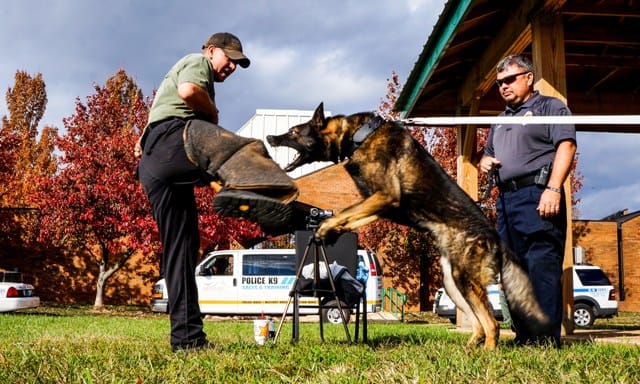
We offer Police K9 Seminars to provide customized training programs to meet the current needs of police K9 units. We have a huge selection of seminars to choose from, including everything from K9 Supervision and Management to Police K9 and SWAT Applications seminars. Our seminars generally last between 1 to 5 days in length and can be held at our dog training center in North Carolina or hosted at your department. Police K9 seminars are a great way to get customized Police K9 training for you and your handlers.
Our seminars are extremely affordable and most of all, we bring the training to you. Hosting a seminar at your department is easy and we provide all the course materials, books, handouts and equipment. Your department is simply responsible for providing a classroom, AV equipment and venues for training.
Police K9 Handler Courses
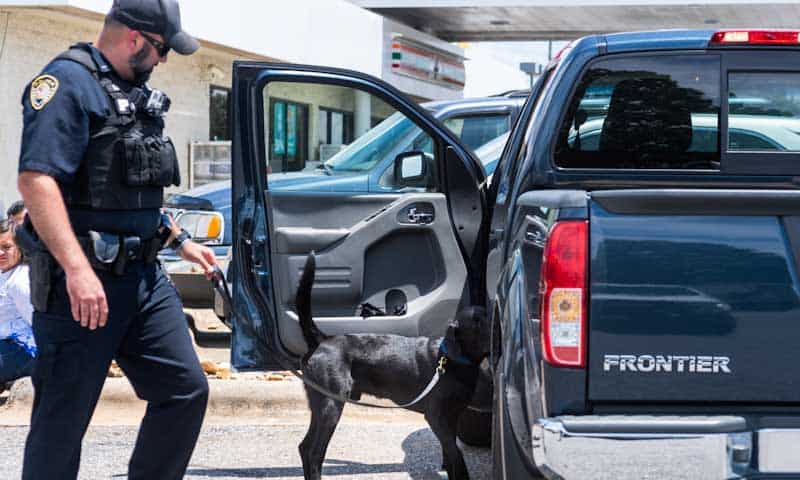
Our Police K9 handler training is the most inclusive in the industry. We offer three and four-week programs to teach police K9 handlers the proper methods and techniques to get the most from their police dog. Our handler courses teach handlers all the skills they need to continue to employ effective police K9 training techniques so that their police K9 is not only properly maintained, but excels in its training throughout the life of the dog. Our police K9 instructors are current or former law enforcement officers who know how important it is for a police K9 to perform effectively on the street.
We offer on-site housing, included with any of our Police K9 handler courses. We also provide course materials and handouts for all of our programs. Our Police K9 handler courses are designed to offer a balance of both classroom learning and practical, hands-on training. During our programs, handlers are subjected to a variety of real-life training problems in real-world settings. We coach handlers through a number of problem solving scenarios during their course to ensure that they are comfortable in their decision making and application of the police K9 during field applications.
Police K9 Instructor Courses
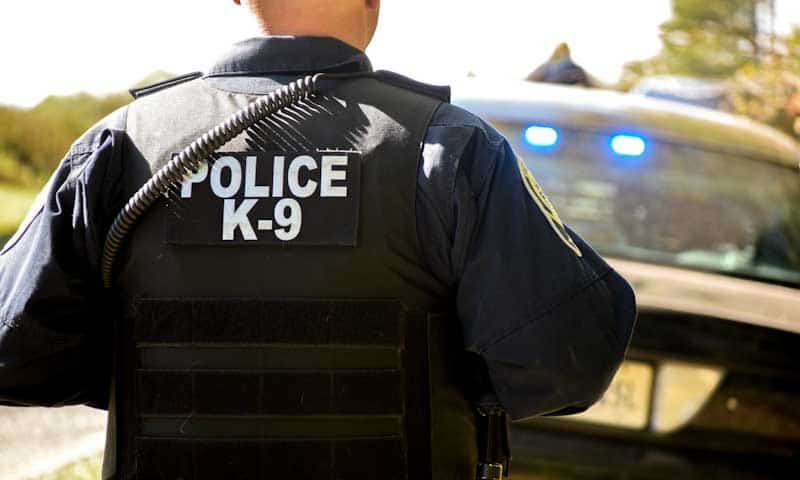
Our School for Dog Trainers offers up-to-date Police K9 Trainer / Instructor as well as Protection and Detection Trainer courses. Our courses vary in length to allow you to learn as much as you would like about police K9 training. Police K9 Instructor / Trainer courses are offered four times per year to fit your schedule. These courses teach the fundamentals of police K9 training as well as advanced techniques and training methods in order to develop effective Police K9 trainers . Our Police K9 Instructor courses teach real-life scenario based exercises so that the information learned can easily and effectively be applied in the field.
We offer on-site housing for those attending our Police K9 Instructor courses for an additional $100 per week. Those attending can bring up to two (2) dogs with them while attending our courses. We also offer free airport pick-up and ground transportation for out-of-state or international students who are attending our courses. Learn more about our Police K9 Instructor Courses
We offer GSA pricing on all of our Police K9 Instructor Courses to provide agencies with great training that is affordable. Our School for Dog Trainers is the first and only of its kind that is licensed by the North Carolina Board of Community Colleges. We offer fast and affordable financing for all of our programs for those who wish to pay for their education over time. Our School for Dog Trainers is also approved to accept GI Bill and other VA benefits for our Police K9 Instructor Program.
Police K9 Supervisor Training
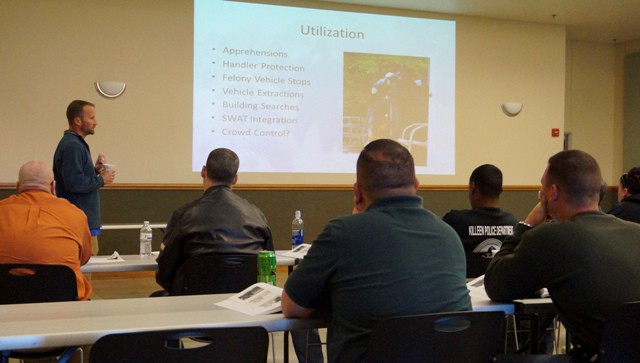
Police K9 Units are often one of the highest liability areas within any agency or department. If established and maintained properly, this liability can be greatly reduced along with increasing productivity and return on investment. Unfortunately, we often find that Police K9 unit managers, supervisors and administrators know far too little about the proper supervision of Police K9 teams. Therefore, we offer a variety of comprehensive programs for Police K9 supervisors and administrators that teach everything you need to know to be a successful Police K9 supervisor.
Our most popular program is our 3-day Police K9 Supervisor Course which covers all aspects of K9 unit management. This course discusses topics such as proper selection of dog and handler, proper deployment, effective allocation and utilization as well as liability and FLSA issues. Our three-day Police K9 Supervisor Course also includes a 200+ page manual that serves as a great reference for supervisors even after the course.
Specialized K9 Training
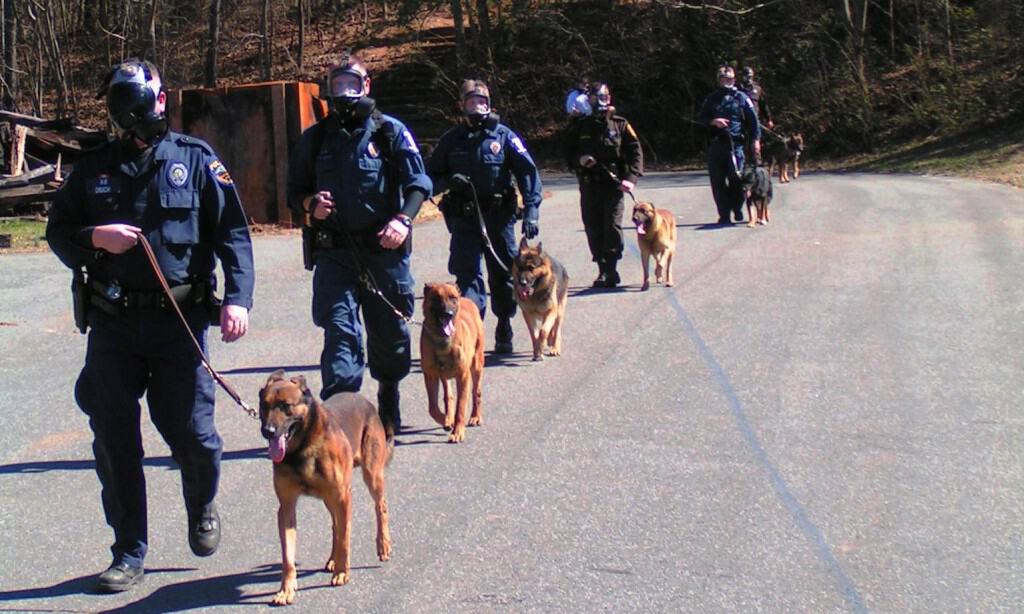
We offer customized courses in varying lengths to meet the individual needs of local, State and Federal agencies both in the United States and globally. By providing us with course objectives, we can create a customized curriculum of training specifically tailored to meet your specific agency needs. We can offer specialized, advanced training courses for detection, patrol, and security dog teams. Customized programs are offered on location at affordable prices.
Our instructors have developed a number of customized Police K9 training programs for law enforcement, military and civilian organizations worldwide. If necessary, we can provide course materials in advance in order for them to be translated for the attendees to ensure that the course is delivered in a way that is most effective. Don’t hesitate to contact us to discuss any specialized training courses that you may be considering. Learn more about our Specialized Police K9 Traini
Online Training

For handlers and trainers that have already attended basic training programs and are looking to hone their existing skills, we now offer online training on advanced topics. These online training courses are designed to provide K9 handlers with continuing education and give them insight into topics that can help them advance their training and operational readiness.
Our Advanced Detection Development Course is the first in this series with many more to come.
Watch CBS News
Meet the police dogs sniffing out COVID-19 at Massachusetts schools
By Tori B. Powell
January 6, 2022 / 8:16 AM EST / CBS News
When Huntah and Duke aren't busy playing catch, the two dogs are usually detecting the presence of COVID-19 in their community. In the past year, the 14-month-old Labrador retrievers have worked at 15 different schools in Massachusetts.
"They love to work," Jonathan Darling, Bristol County Sheriff's public information officer, told CBS News Wednesday. "And then when they're not working, they just want to give you kisses and we love it. They're so cute."
K9s Huntah and Duke visited Norton Middle School today for some Covid-detection work. Thanks to Supt. Baeta and everyone from @NortonSchools and @FIU_Forensics for the help. pic.twitter.com/5NdOgIQP2W — Bristol County Sheriff's Office (@BristolSheriff) January 5, 2022
Darling said the police department reached out to the Forensic Center at Florida International University last year regarding an emerging study on dogs that can detect COVID-19 odors. Pulling from research dating back to 1993, researchers at the school trained dogs to identify different odor characteristics of things like fungi and viruses.
The study found dogs to be more than 90% reliable in detecting COVID-19 odors, with a very low false positivity rate. So, FIU sent the trained dogs to work on the school's campus and at state emergency operations. They even screened at the Miami International Airport.
Last year, Duke and Huntah were enrolled in the school's training program, where they practiced with face masks worn by people with COVID-19, Darling said. When the two graduated in July, they became the first law enforcement K9s in the country trained to detect the virus.
BCSO K9s Huntah and Duke are the first law enforcement K9s in the country trained to detect COVID. We celebrated at a small graduation ceremony yesterday. Huntah is Capt. Douglas’ partner and Duke is paired with Officer Santos. @SheriffHodgson pic.twitter.com/fohQMK5mnW — Bristol County Sheriff's Office (@BristolSheriff) July 15, 2021
Since graduating, the two sibling pups have worked in three different school districts, police stations, a local health department, town halls and office buildings.
The dogs are trained to sit down in front of an area where a COVID-19 odor is detected. The dog will then alert their handler so that they can mark the area as one to focus on for cleaning. Darling said the dogs are not used in place of COVID-19 testing.
Duke and Huntah also bring joy to the community, Darling said.
"The kids in the hallway just love seeing the dogs and the teachers love to see them and we just bring smiles to people's faces," he said. "So in addition to helping keep everybody safe against COVID, if you can bring a smile to somebody's face, it's totally worth it."

Tori B. Powell is a breaking news reporter at CBS News. Reach her at [email protected]
More from CBS News

County sheriffs wield lethal power, face little accountability

Man seriously injured by grizzly bear while hunting with father

How top aides are addressing fears they have for safety of lawmakers, staff

Pope Francis on his health and whether he'd ever retire
- Skip to main content
- Keyboard shortcuts for audio player
Not Everyone, Or Every Dog, Has What It Takes To Pass The Police Academy
Fifty-four dogs, mostly German and Dutch shepherds, we're rejected from the police dog training program in China's Liaoning province for various reasons, including failure to bite on command.
Copyright © 2021 NPR. All rights reserved. Visit our website terms of use and permissions pages at www.npr.org for further information.
NPR transcripts are created on a rush deadline by an NPR contractor. This text may not be in its final form and may be updated or revised in the future. Accuracy and availability may vary. The authoritative record of NPR’s programming is the audio record.
.png)
Washington State Police Canine Association
Providing education and support for police officers and their canine partners.
Our mission is to keep our communities safe
For more than four decades, the Washington State Police Canine Association has advanced the practice of law enforcement and corrections officers utilizing K9s to protect our communities .
We strive to promote the highest standards of training, safety, and care for K9s in our state. We also work to increase public awareness of the valuable service these animals provide to our communities, and the dedication of their handlers.

Industry-leading courses and seminars
The Washington State Police Canine Association holds a variety of training courses and seminars throughout the year.
Some of the training courses that we've offered include:
Generalist & Patrol Scenarios
Learn to overcome challenges as a team and gain insight on how others approach problems.
Explosive & Narcotic Scenarios
Learn from industry experts and experience a variety of exposure and scenario-based training.

Honoring fallen K9 heroes
WSPCA honors the police canines that have been killed in the line of duty serving alongside Washington's law enforcement officers.
Officer Jack Anderson
Vancouver Police Department
Deputy Travis Brunner
King County Sherrif's Office
Officer Henry Betts
Tacoma Police Department
Officer Chip Higinbotham
Everett Police Department
Help us support retired police dogs
The WSPCA Retired Police Dog Medical Fund is dedicated to providing retired police dogs with the medical care they need in their golden years.
These loyal animals have dedicated their lives to serving and protecting their communities , and now it's our turn to show them the same level of care and compassion they have shown us.
By donating to this fund , you can help ensure that these retired heroes receive the medical attention they deserve.

Join a team of K9 professionals
The Washington State Police Canine Association welcomes all police K9 handlers and offers a variety of membership benefits, including industry-leading training and certification .
Accreditation of K9 teams is provided at no cost to you or your agency.
Accreditation can be a costly process, involving training, evaluation, and certification fees, which may pose a challenge for smaller agencies or departments with limited resources.
Membership in WSPCA can help to reduce this financial burden and make it more accessible for law enforcement agencies to obtain accreditation for their canine teams.
Among the many benefits of accredication are improved safety and effectiveness of canine units, increased public trust and confidence, and enhanced professional development and recognition for team members.
Members enjoy reduced fees to our two annual seminars.
These training seminars provide opportunities for canine handlers and trainers to learn new skills, share best practices, and stay current on the latest developments in canine law enforcement.
By offering reduced fees to members, the association aims to make the seminars more accessible and affordable, while also providing a benefit to its members and encouraging participation in professional development opportunities.
Gain access to our many K9 trainers located all over the state.
The association maintains a directory of trainers who have been vetted and approved by the organization, and who meet established standards of professionalism and expertise in canine law enforcement.
By providing access to this network of trainers, the association aims to support the ongoing training and development of its members' canine units, while also promoting collaboration and knowledge-sharing among law enforcement agencies across the state.
Network with other handlers located across Washington.
The association organizes various events, such as seminars, conferences, and training sessions, which bring together canine handlers from different agencies to share experiences, learn from each other, and build relationships.
Through networking, members of the association can expand their professional contacts, stay informed on the latest trends and challenges in canine law enforcement, and gain valuable insights into how other agencies are addressing similar issues or situations.
Latest articles and news from WSPCA
Wspca resources.
Port of Seattle Police K9
Spokane Police Department K9
Redmond Police Department K9
Canine legal update & opinion
Sheepdog Guardian Consulting
Police k9 Magazine
Police K9 Magazine
K9 Training
Police One - K9 Training
Police One - K9 Videos
Police Grants Help
Police Department & Law Enforcement Grant Assistance
Ray Allen Manufacturing
Professional K9 Equipment
Dog Sport Gear
High Quality Training Equipment
Become a member today!
- 936.825.9900

- Meet The Founder
- Board Members
- Results & Highlights
- Sponsor a Dog
- License Plates
- Amazon Smile
- Planned Giving
- Apply For a K9 Grant
Our Mission
To support school districts and college campus police departments with K9s trained and ready for service.
K9s4KIDs provides trained K9s to schools and universities and was created in 2013 after the tragic shooting at Sandy Hook. The K9s4KIDs initiative provides K9s to schools making them a safer place for students, faculty, staff and visitors.
K9s4KIDs was created to sustain an alternative, kinder and gentler approach to keeping our school children safe.
Statistics show that having a trained K9 on campus serves as a double deterrent, keeping narcotics from being distributed and serving as a personal protection barrier between potential harm to our innocent students. These exceptional K9s, along with their handlers, sweep thousands of classrooms, lockers and cars each school year.
In addition to the safety of having a trained police dog on campus to protect the students— these four-legged officers and their handlers provide outreach by visiting with students at school assemblies, events and participating in crime safety prevention presentations. These fast acting K9s also provide security at sporting events and school venues and have protected an estimated two million people from the threat of bombs and explosives.
We are committed to being part of a solution that works to keep our communities, schools and children safe.
We do not believe that budget cuts should get in the way of our children’s safety. If your school district or campus police is in need of a K9 and needs assistance, please see our FAQs below and contact us at 936- 825-9900 or at [email protected]
Putting our children first by creating safe campuses across the nation with K9s trained and ready for service.

K9s4KIDs Statistics
* numbers are an estimate of reported performance stats from K9s4COPs/K94KIDs handlers through September 30, 2019.

SCHOOL K9S FAQ
What does a k9s4kids grant consist of .
A K9s4KIDs grant consists of a K9 and initial training for the K9 and its handler. K9s and initial training costs start at $15,000+ depending on the K9’s specialty (i.e. narcotics or explosive detection). We do not offer monetary grants, pay for handler’s salaries, vehicles or supplies.
How can I get trained K9 in my child’s school?
Your school district or university must have an existing school police department with a full-time paid commissioned K9 handler with whom the K9 will live with and who will be responsible for taking care of the K9 daily. K9 officers are granted to a school district police department and must be approved by the school district’s board. In addition- the school district or campus police must be able to provide for all expenses associated with the dog. This includes: vehicle outfitted with K9 cage for car and heat sensor alarm, food, shelter, training, medical care and equipment for K9 (leashes, vests, collars, toys).
My school district or college campus meets all of the above criteria. How can they apply?
The school district or campus police department will need to apply for a K9 from K9s4COPs through our website here: https://k9s4copsprd.wpengine.com/apply/
How can I sponsor a K9 for a school district or university?
We can match you with an agency that has already applied for and been approved for a K9s4COPs grant. Sponsorships start at $15,000 for a single-purpose K9 (i.e. narcotics or explosive detection only to $20,000+ for a dual-purpose (i.e. narcotics and patrol or explosives and patrol). Please see here for more info on sponsoring a K9: https://k9s4copsprd.wpengine.com/sponsor-a-dog/
Can our school district hold a fundraiser or crowd-fund to pay for our K9?
Yes, as long as your school district or campus police has applied for a K9 through K9s4COPs and meets all criteria, you are welcome to hold your own fundraising event to help pay for the K9 and be awarded a grant faster. Event ideas include fun runs, golf tournaments, galas etc. If online crowd funding is more your thing— we encourage you to start a virtual fundraiser for K9s4COPs. This can be done in two ways:
K9s4COPs can set up a direct fundraising campaign page/link through our website that would be a specific to the agency/school. This link can then be shared via text, email, or social media with friends, family, fellow parents and the community to crowd-fund the K9 grant. Keep in mind that if you get a company or individual or a group of people to fund the entire cost of dog—- they will get to name the K9 and could be invited to a special meet and greet with K9 etc. A great benefit for you to promote to your potential donors.
All the 100% tax deductible donations will go directly to K9s4COPs and be saved as restricted funds for the purchase of a K9 for the school district or university. Once you reach your goal (or amount it costs to pay for the K9 and training— then a K9 will be granted to your agency). This might be a faster way to get a K9 granted— if you can rally your school community behind you.
Where do your K9s come from?
Our K9s come from approved and licensed K9 facilities and trainers that specialize in working dogs and are able to provide a broad selection of K9s for our grantees to select from.
News from Houston ISD
Hisd police department comfort dog helps ease back-to-school jitters.
First impressions are always hard, but Jamaica took the first day of school in stride.
The hypoallergenic Bernedoodle — a special breed that has Bernese Mountain Dog and Poodle parents — welcomed Wesley Elementary School students back to school with her tail wagging and a paw-sitive attitude.
The pup recently joined HISD Police as the department’s first-ever comfort dog, working on campuses across the district to help combat stress and anxiety in students and build trust between police, students, and the community.
“Coming back post-pandemic, we understand that some kids are going to have some adaptation problems,” HISD Police Chief Pete Lopez said. “It’s our hope that Jamaica will help ease that transition from being at home to being back at school and being social again.”
Also present on the first day at Wesley was Luci, a chihuahua, who works as a comfort dog in the Social and Emotional Learning department. That program strives to increase student academic achievement within a safe educational environment by addressing emotional and behavioral barriers to learning. They also have a second dog, Omie, who is a miniature goldendoodle.
“During this time, it’s especially important for our students to be able to self-regulate, build relationships, and (participate in) conflict resolution,” said Dr. Roberta Scott, who serves as the director of Social and Emotional Learning.
Together, the three dogs will participate in the Pet Assisted Wellness Support Program, or PAWS. Offered in partnership with HISD Police and Social Emotional Learning, the program is designed provide comfort and support to students in crisis.
“One of the goals we have for that program is to take away the stigma between the police department and students,” Scott said. “We have a lot of work to do but we are excited about launching this program with HISD Police.”
Students will have the opportunity to help HISD Police give Jamaica a new name through a districtwide renaming contest [information can be found here ]. Each HISD classroom can submit one name for the new pup online .
The winning name will be chosen by HISD Police, with the winning classroom earning a free pizza party and a visit from Jamaica. A drawing will be held to determine the winner in the event of multiple submissions with the same name.

National Tactical Police Dog Association

Certifications
Police K-9 Certification Standards of the National Tactical Police Dog Association, Inc. (NTPDA) in all or any areas of:
Article Search
Tracking/Trailing
Narcotics Detection
Explosives Detection
Eligibility for Certification
NTPDA shall have two categories of certification:
Police K-9 team certification. This category of certification is a working law enforcement K-9 team certification.
Professional Handler/Trainer Proficiency Certification. This category of certification allows professional trainers and/or handlers to demonstrate their training through passing the NTPDA evaluation. This is not a working law enforcement K-9 team certification, but rather a certificate of proficiency. Civilian police dog trainers and or handlers must be members in good standing of NTPDA to qualify. Examples: Professional Police Dog Trainers, Private Detection Handlers, K9 Security Officers, SAR K9 Handlers attached to a Volunteer SAR Team, Emergency Management, or Law Enforcement Agency. An official Letter must accompany the handler to the certification attesting to the affiliation dated within a week of the certification.
The following memberships available in NTPDA:
Professional Membership Law Enforcement Membership Departmental or Agency Membership
NTPDA Membership Application
Certification Fees
The fee for certification shall be as follows for NTPDA members.
(Note you must be a member of NTPDA to certify in the following areas)
Patrol Certification: $75
Narcotics Certification: $50
Explosives Certification: $50
Trailing certification: $50
Article Search Certification: $50
Human Remains: $50

Georgetown Police Department Partners With Northeast Canines for School Visit by Service Dogs
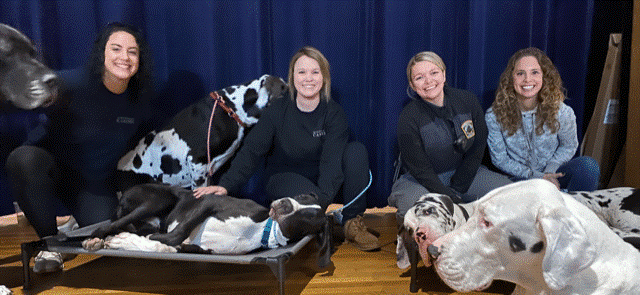
Six Great Dane comfort dogs from Northeast Canine recently visited Georgetown Middle High School, through a collaboration with the Georgetown Police Department. From left, Northeast Canine Founder Megan Kokaras, Trainer Maggie Hackett, School Resource Officer Taylor Ford, and Trainer Devin Diberto. (Photo Courtesy Georgetown Police Department)
GEORGETOWN — Chief Donald C. Cudmore is pleased to share that the Georgetown Police Department recently collaborated with Northeast Canine for a visit by service dogs to Georgetown Middle High School.
School Resource Officer Taylor Ford, who volunteers with the non-profit, helped arrange the visit. Northeast Canine trains Great Danes as service dogs and matches them with first responders or veterans with mobility issues.
Six Great Danes -- Goose, Luna, Maverick, May, Sofia, and Thor -- visited Middle High School students and staff on Friday, Jan. 21, providing comfort and respite during the day. Thor and Luna are currently in training, and upon completion will be matched with a veteran who is in need.
“It was really great to see how much everyone enjoyed it. A lot of people said they were having a hard time and that this was the best part of their day,” Officer Ford said. “I hope to have Northeast Canine make routine visits to the school.”
“The pandemic has been trying for many of our schoolchildren,” Chief Cudmore said. “I commend Officer Ford for ensuring the social and emotional well-being of our students, and for helping to brighten their day. Programs like this show the value of a school resource officer to our community.”
More information about Northeast Canine can be found at their website, https://www.northeastcanine.com .
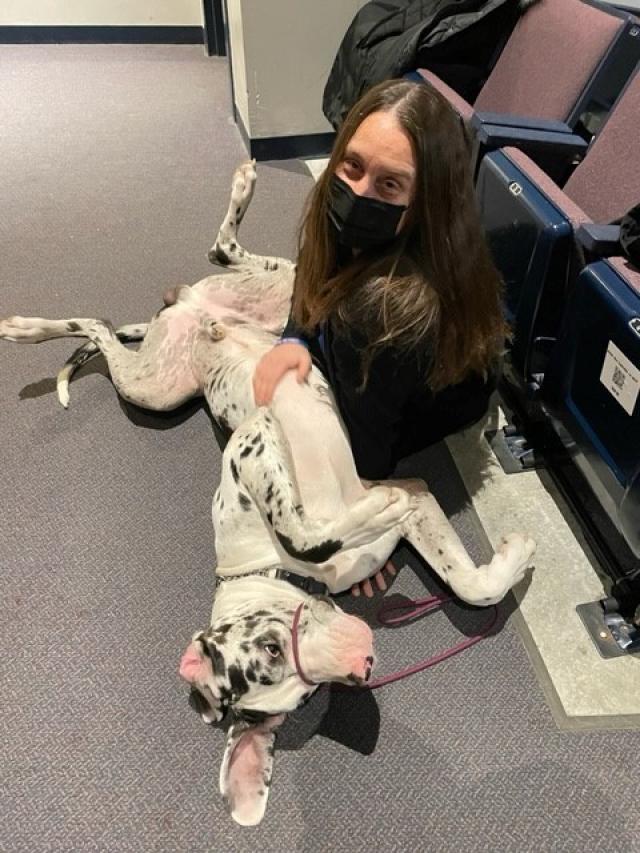
Amanda Girard, Middle School Coordinator for the Georgetown Public Schools, spends quality time with comfort dog Thor. (Photo Courtesy Georgetown Police Department)
Wednesday, Jan. 26, 2022
Media Contact: Tom Zuppa Phone: 617-993-0003 Email: [email protected]

JIREH K9 Training Academy https://www.jirehk9.com/ 9520 US HWY 87 E San Antonio, Texas 78263 (210) 379-1396
POLICE CANINE SNIFFS IN PUBLIC SCHOOLS
©2010 Brian S. Batterton, Attorney, Legal & Liability Risk Management Institute (LLRMI.COM) As public school officials attempt to combat the problem of illegal drugs at school, the use of police drug sniffing canines is becoming more prevalent. It is well established that canine sniffs of lockers and parked cars do not constitute a “search” under the Fourth Amendment . i However, in some situations, the facts leading up to the use of a canine may implicate the Fourth Amendment by constituting a seizure of a person or property prior to the use of the canine.
On March 5, 2010, the Court of Appeals of Texas (Austin) recently decided In the Matter of D.H. ii , which dealt with such an issue. The facts of D.H. are as follows:
In October 2006, officers from the Austin Police Department arrived at Reagan High School to conduct a canine search of the school. D.H., who was sixteen at the time, was a student at the school. Assistant Principal Mike Perez led the officers through the school, allowing the dog to sniff several classrooms on each floor of each building. For every inspection, Perez entered the classroom and informed the teacher of the sweep. The students were then instructed to leave their property in the classroom and wait in the hall, and the police entered and allowed the dog to sniff the items left in the room. The students were not allowed to refuse the instructions or to take their items with them. When the officers searched D.H.’s classroom, the dog reacted to her backpack. The officers called D.H. into the classroom, read D.H. her rights, and searched her bag, where they found a small bag of mariJuana. iii
D.H. filed a motion to suppress with the trial court alleging that her bag was seized without reasonable suspicion when she was required to leave it in the class while the canine conducted a sniff of all bags in the room. The trial court denied the motion to suppress.
D.H. appealed and argued (1) her backpack was seized for Fourth Amendment purposes when she was required to leave it in the class and (2) the seizure was not supported by reasonable suspicion since neither the officers nor school official had a reason to believe that she was engaged in a school rule or law violation. iv
The Court of Appeals of Texas (Austin) first examined some general rules regarding searches and seizures in schools. The rules are as follows:
- Although probable cause and a warrant are generally required before law enforcement may conduct a search, a search unsupported by probable cause may be reasonable ‘when “special needs, beyond the normal need for law enforcement, make the warrant and probable-cause requirement impracticable. v [internal quotations omitted]
- Although students in public schools do not shed their constitutional rights . . . at the schoolhouse gate, their constitutional rights are not automatically coextensive with the rights of adults in other settings, and must be considered in view of the school environment. vi [internal quotations omitted]
- The public-school context requires a relaxed standard of reasonableness because insisting on “the warrant requirement would unduly interfere with the maintenance of the swift and informal disciplinary procedures [that are] needed,’ and ‘strict adherence to the requirement that searches be based on probable cause’ would undercut ‘the substantial need of teachers and administrators for freedom to maintain order in the schools. vii [internal quotations omitted]
- In determining whether a search or seizure of a student or her property conducted was reasonable, we first consider the nature of the implicated privacy interest , then consider the character of the intrusion , and finally consider the nature and immediacy of the government’s concerns and the efficacy of the [school’s action] in meeting them . viii [emphasis added]
- [T]he Supreme Court has expressly refused to impose a requirement of “individualized reasonable suspicion of wrongdoing” on schools’ attempts to prevent student drug use. ix
The court of appeals then declined to decide whether or not D.H.’s bag was seized within the meaning of the Fourth Amendment ; rather, the court stated that they would assume the seizure occurred (since a seizure occurs if there is meaningful interference with a person’s possessory interest in property) and decide the case based upon whether such a seizure of D.H’s bag was reasonable in the public school setting.
Thus, the issue before the court was whether the seizure of D.H.’s bag by requiring her to leave it in her class while a conducted conduct a sniff of all bags in the class was reasonable under the Fourth Amendment as applied in the school setting.
The court then applied the facts of D.H.’s case to the rules above. The court stated that to determine whether the seizure of the bag was reasonable, they would use the three part test from the rule above (see fourth bullet point) and examine (1) the nature of the implicated privacy interest, (2) the character of the intrusion, and (3) the nature of the schools concerns and the efficacy of the seizure in addressing those concerns (drugs). x
Thus, the court first examined the privacy interest that was frustrated by the seizure of D.H.’s backpack. In light of the fact that students have a somewhat lessened expectation of privacy at school and are sometimes subjected to greater control than adults in a public environment, the court stated
considering that D.H.’s backpack was not opened, nor were its contents examined, until after the dog alerted on it, and bearing in mind the control and supervision that school authorities must properly exercise in their roles as guardians and tutors of their students, we hold that restricting D.H.’s ability to take her backpack with her implicated a relatively minor privacy interest. xi [emphasis added]
Second, the court of appeals considered the nature or type of infringement of D.H.’s privacy rights. The court noted that the students were removed from the class and only the police officers and the assistant principal were in the class at the time of the canine sniff. As such, there was no likelihood that D.H.’s backpack was likely to be stolen and there were no other students around that may embarrass D.H. The court then stated
Given the method employed in conducting the canine inspection and the minimally intrusive nature of the inspection, we hold that the invasion of D.H.’s privacy was not significant . xii [emphasis added]
Last, the court of appeals considered the nature and immediacy of the government’s (schools) concerns and the efficacy of the seizure of D.H.’s bag in meeting those concerns. The court noted that, in previous cases, the United States Supreme Court has stated that there is an important or perhaps compelling government interest in preventing drug use by schoolchildren. xiii The assistant principal testified that he knew there was a drug problem at the school because school officials have found marijuana being sold at school as well as children returning from lunch under the influence of drugs. The assistant principal also said that drugs at school are a serious safety issue due to belligerent behavior as well as dangerous physical reactions. He also said that the school officials were always on the lookout for drug use. Additionally, students and parents sign off on the student handbook which contains the school policy prohibiting drugs at school. The court then stated
Considering the low level of intrusion on D.H.’s limited privacy rights and the evidence about the drug problem at Reagan High, we hold that the seizure effectively addressed the problem of student drug use and served the important governmental interest in protecting the students’ safety and health . xiv [emphasis added]
In light of analysis of the three part test to determine if the seizure of the bag was reasonable, and in light of other court precedent from other jurisdictions xv , the court held that the brief seizure of D.H.’s bag by requiring her to leave it in her class as a canine conducted a sniff, was reasonable under the Fourth Amendment in a public school setting.
________________
NOTE: Court holdings can vary significantly between jurisdictions. As such, it is advisable to seek the advice of a local prosecutor or legal advisor regarding questions on specific cases. This article is not intended to constitute legal advice on a specific case.
SEE RELATED ARTICLES:
Georgia Court Upholds Canine Sniff During Traffic Stop U.S. Supreme Court Upholds Canine Sniffs of Vehicles Locker Searches and use of K9’s More School-Related Articles
i Horton v. Goose Creek Indep. Sch. Dist ., 690 F.2d 470 (5th Cir. 1982); see also United States v. Place , 462 U.S. 696 (1983); Illinois v. Caballes , 543 U.S. 405 (2005)
ii 306 S.W. 3d 955, 2010 Tex. App. LEXIS 1610
iii Id. at 957
v Id. at 957-958
vi Id. (quoting Morse v. Frederick , 551 U.S. 393, 396-97, 127 S. Ct. 2618, 168 L. Ed. 2d 290 (2007) (quoting Tinker v. Des Moines Indep. Community Sch. Dist ., 393 U.S. 503, 506, 89 S. Ct. 733, 21 L. Ed. 2d 731 (1969); Bethel Sch. Dist. No. 403 v. Fraser, 478 U.S. 675, 682, 106 S. Ct. 3159, 92 L. Ed. 2d 549 (1986); Hazelwood Sch. Dist. v. Kuhlmeier , 484 U.S. 260, 266, 108 S. Ct. 562, 98 L. Ed. 2d 592 (1988)).
vii Id . (quoting Acton, 515 U.S. at 653 (quoting T.L.O., 469 U.S. at 340-41); see Earls, 536 U.S. at 828-29; see also Safford Unified Sch. Dist. # 1 v. Redding, 129 S.Ct. 2633, 2639, 174 L. Ed. 2d 354 (2009)
viii Id. (citing Earls, 536 U.S. at 830, 832, 834)
ix Id . (citing Earls, 536 U.S. at 837)
x Id. at 959
xiii Id. (citing Acton , 515 U.S. at 661)
xiv I d . at 960
xv Id. at 960 fn3 (See also Louisiana v. Barrett , 683 So.2d 331, 338 (La. Ct. App. 1996) (school required students to empty pockets onto desk and leave classroom to allow drug dog to sniff belongings; “Taking into account the decreased expectation of privacy defendant had as a student, the relative unobtrusiveness of the search, and the severity of the need met by the search, we conclude the type of search conducted in this case (wherein defendant was asked to empty his pockets and leave the room) is reasonable and hence constitutional.”); Smith v. Norfolk City Sch. Bd., 46 Va. Cir. 238, 244-45, 261 (Va. Cir. Ct. 1998) (students were required to leave belongings in classroom to be sniffed by drug dog; “Balancing Condon’s lessened privacy interests and the minimal intrusion upon them against the strong governmental concerns with drugs and guns, this Court concludes that Condon’s rights were not violated by the brief seizure of his belongings.”).

Share This Story, Choose Your Platform!
About the author: brian s. batterton, j.d..

Related Posts

ELEVENTH CIRCUIT – EVEN IF OFFICER CHARGES WRONG OFFENSE THE ARREST IS STILL LAWFUL IF THERE WAS P.C. FOR SOME OTHER OFFENSE

SEVENTH CIRCUIT – FRONT PORCH RECEIVES THE SAME FOURTH AMENDMENT PROTECTION AS INSIDE THE HOME

NINTH CIRCUIT: OFFICERS CANNOT DETAIN AND HANDCUFF A PERSON FOR THE PURPOSE OF ISSUING A CRIMINAL TRESPASS WARNING

IMAGES
VIDEO
COMMENTS
The National Police Dog Foundation is always taking applications for volunteers. We need help in every area of fund raising. If you, or someone you know, would like to help you can begin by becoming a member or making a donation. Without your support, K-9 programs run the risk of being eliminated whenever departments are in financial distress.
NPCA strives to be the best resource for the professional canine unit. NPCA offers nationally accepted certifications throughout the year, across the United States. NPCA also provides regional and national canine training seminars. Our certifications offer realistic and attainable goals for today's working service dog team.
The National Police Dog Foundation is registered as a 501(c)(3) nonprofit organization. Contributions are tax deductible to the extent permitted by law. The tax identification number is 77-0496014.
Though the visit was arranged by first-grade teachers, the entire school was able to see the dogs in action and learn about what they do to help police and keep the community safe. PHOTOS: First ...
The National Police Dog Foundation assists law enforcement agencies to ensure that the handlers and K-9s are receiving the very best training. The initial training of K-9s and related training can be very expensive. Many many hours of hard work goes into training and preparing the K-9s for the many different scenarios they will face in active duty.
This research suggests that there are seemingly endless ways that dogs can improve current school safety initiatives. If the problem is with physical security, a specially trained dog can be brought in to enhance security. If the problem is with stress and emotional issues, a therapy dog has that covered. Whatever the need, bringing in a dog ...
Our School for Dog Trainers offers up-to-date Police K9 Trainer / Instructor as well as Protection and Detection Trainer courses. Our courses vary in length to allow you to learn as much as you would like about police K9 training. Police K9 Instructor / Trainer courses are offered four times per year to fit your schedule.
Support. Much of the support for school-placed dogs stems from the success of canine roles in law enforcement and military agencies. On the surface assigning police dogs to schools would seem to extend their law enforcement duties; however, training and enforcement methods would differ due to the highly social environment in which these animals work.
GEORGETOWN — Chief Donald C. Cudmore is pleased to share that the Georgetown Police Department recently collaborated with Northeast Canine for a visit by service dogs to Georgetown Middle High School. School Resource Officer Taylor Ford, who volunteers with the non-profit, helped arrange the visit.
The study found dogs to be more than 90% reliable in detecting COVID-19 odors, with a very low false positivity rate. So, FIU sent the trained dogs to work on the school's campus and at state ...
The Virginia Police Canine Association encourages and supports the professional development of working dogs and their handlers within duly constituted law enforcement agencies in the Commonwealth of Virginia. ... The Virginia Police Canine Association is a law enforcement group training and certifying police dogs for Patrol use, Tracking ...
Join the oldest and largest police K-9 association in the US and access training, certification, grants and events for your canine partner.
NTPDA is a different kind of certification organization. First, our certification is truly a tactical team certification, not only evaluating the dog's performance, but the tactical competence of the team leader - the K9 officer. Our standards and training are focused on performance, competence, and safety. NTPDA certifications are ...
Fifty-four dogs, mostly German and Dutch shepherds, we're rejected from the police dog training program in China's Liaoning province for various reasons, including failure to bite on command.
The Washington State Police Canine Association welcomes all police K9 handlers and offers a variety of membership benefits, including industry-leading training and certification. Accreditation. Reduced fees. Trainers. Networking. Accreditation of K9 teams is provided at no cost to you or your agency.
K9s4KIDs provides trained K9s to schools and universities and was created in 2013 after the tragic shooting at Sandy Hook. The K9s4KIDs initiative provides K9s to schools making them a safer place for students, faculty, staff and visitors. K9s4KIDs was created to sustain an alternative, kinder and gentler approach to keeping our school children ...
The pup recently joined HISD Police as the department's first-ever comfort dog, working on campuses across the district to help combat stress and anxiety in students and build trust between police, students, and the community. "Coming back post-pandemic, we understand that some kids are going to have some adaptation problems," HISD Police ...
Civilian police dog trainers and or handlers must be members in good standing of NTPDA to qualify. Examples: Professional Police Dog Trainers, Private Detection Handlers, K9 Security Officers, SAR K9 Handlers attached to a Volunteer SAR Team, Emergency Management, or Law Enforcement Agency. An official Letter must accompany the handler to the ...
(Photo Courtesy Georgetown Police Department) GEORGETOWN — Chief Donald C. Cudmore is pleased to share that the Georgetown Police Department recently collaborated with Northeast Canine for a visit by service dogs to Georgetown Middle High School. School Resource Officer Taylor Ford, who volunteers with the non-profit, helped arrange the visit.
San Antonio, Texas 78263. (210) 379-1396. The JIREH K-9 Training Academy is a Veteran and Police Officer owned and operated Police K-9 Training service. JIREH K-9 is located in beautiful La Vernia, Texas just east of San Antonio. Contact The JIREH K-9 Training Academy for infomration about our.
My school is doing a project on police dogs, can we have a visit? Unfortunately most police forces do not provide this service as standard and if they did it may just be for a special event or occasion. However any requests can be made via local policing teams or schools that have dedicated police officers or PCSOs.
In October 2006, officers from the Austin Police Department arrived at Reagan High School to conduct a canine search of the school. D.H., who was sixteen at the time, was a student at the school. Assistant Principal Mike Perez led the officers through the school, allowing the dog to sniff several classrooms on each floor of each building.
Surrey Police and Sussex Police Dog Training School are internationally recognised, and train and supply specifically trained dogs to countries all over the world. Visit our site to find out about security dog training, police dog training, drug dog training, and other specialist dog training courses.